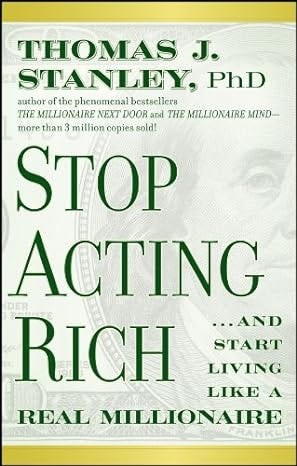How to accumulate real wealth instead of faking it
Reflections on “Stop Acting Rich: ...And Start Living Like A Real Millionaire” by Thomas J. Stanley
(5 min read)
Katie and I recently read Stop Acting Rich: ...And Start Living Like A Real Millionaire by Thomas J. Stanley.
Stanley has dedicated his career to surveying people (especially millionaires) about their spending, their investments, and their life satisfaction.
He has compiled an impressive abundance of stats.
Many people mistakenly equate flashy consumption with wealth.
You see someone driving a Mercedes or Maserati and think “That person must be wealthy.”
But wealthy people very often lead more modest lifestyles.
conspicuous consumption. noun. public enjoyment of possessions that are known to be costly so that one's ability to pay for such things is flaunted.Stanley contrasts “aspirationals” (those who aspire to appear wealthy) with true millionaires, showing that the former group tends to spend more on status symbols like luxury cars and designer clothes (often at the expense of their financial stability).
One of the core messages of the book is the importance of frugality.
Stanley finds that many millionaires live below their means, driving used cars, living in modest homes, and avoiding wasteful expenditures.
This frugality is a key factor in their ability to accumulate and maintain wealth over time.
This reminds me of one of the wealthiest people I knew (who had tens of millions of dollars, if not hundred of millions). He shopped at Marshalls.
I also think of my parents.
I don’t know how much money my parents have, but they’re more than comfortable.
Yet my dad is extreme enough in his frugality that he’ll stand in line at Walmart for 30 minutes to return a $5 t-shirt that didn’t fit (which might not make sense as a great use of his time, but you get the point).
Another common trait among wealthy individuals is that they prioritize investing in appreciating assets rather than spending on depreciating ones.
✅ Real estate, stocks, and businesses are common investments among the wealthy, which contrasts sharply with the spending habits of those who care more about appearances.
❌ Luxury watches, cars, expensive nights out, etc.
Rich: Being rich typically refers to having a high income or a large amount of money available for spending.
It is often associated with a high standard of living, luxury items, and an ability to afford expensive things.
However, being rich does not necessarily imply long-term financial stability.Wealthy: Being wealthy goes beyond having a high income.
It refers to having a substantial amount of accumulated assets (such as investments, real estate, and savings) that generate ongoing income or appreciate in value over time.
Wealth implies long-term financial security and the ability to maintain one's standard of living without needing to actively work for an income.Hedonic adaptation: People tend to adapt to their circumstances over time, meaning that the happiness derived from increased consumption can be temporary.
Long-term satisfaction often comes from non-material aspects of life, such as relationships, personal growth, and meaningful activities.Does wealth really matter? What about enjoying life?
Some people ask:
Given that you don’t know how long you’ll live, isn’t it risky to scrimp and save rather than “live it up” right now?
Surely dedicating some percentage of your spending to luxuries makes sense.
Otherwise you’re not stopping and smelling the roses.
You’re deferring enjoyment till later (or never, if you die suddenly).
I don’t look at it that way. I agree with Stanley here.
People generally mistake what leads to peace, satisfaction, fulfillment, and joy.
They overestimate the benefit of their consumption.
Positive emotions more often come from quality time with people you care about, memorable experiences, etc.
Empirically, we see (from vast amounts of data) that splurging on fancy brands leads to only fleeting delight.
For me, financial security provides peace of mind.
(Read to the end for more of my personal experience.)
Stanley suggests financial stability reduces stress and anxiety, contributing to overall life satisfaction.
One of the core messages of the book is that individuals who live authentically without feeling the need to constantly display their wealth tend to be happier.
The pressure to keep up appearances can lead to financial strain and decreased life satisfaction, whereas those who are content with a modest lifestyle often experience greater well-being.
The book also touches on the importance of healthy relationships.
Wealthy individuals who maintain strong family ties and social connections tend to report higher levels of life satisfaction.
Their assets produce income for them without requiring their additional effort.
Their calendars are more free, and they can invest in their relationships, contributing to a richer, more fulfilling life.
🤔 Critiques of the book
Changing Economic Landscape
The book was published in 2009, and the economic landscape has evolved since then.
The rise of the gig economy, technological advancements (including anticipation of more soon to come because of cheaper energy, AI, etc), and changes in the job market and housing market have altered the ways people earn and manage money.
Emotions
People’s financial decisions are influenced by emotions, cognitive biases, and mental health.
Understanding and addressing these psychological factors can be crucial for achieving long-term financial stability.
If you have a habit of overspending, a book that just tells you not to do it won’t be as helpful as one that helps you explore the emotions that have led to your behavior.
Discrimination
The book largely discusses individual behaviors without delving into systemic issues such as economic inequality and access to opportunities.
While personal financial habits are important, broader societal factors also significantly impact an individual’s ability to accumulate wealth.
😱 The main way this book challenges my thinking
Generally, I feel like an oddball who doesn’t follow tradition or convention much.
And someone who intuitively has always prioritized “function over form” (utility instead of style).
Efficiency. Frugality. Durability. Etc.
So mostly I didn’t feel like I was the intended reader.
I feel financially smart already.
Katie started reading the book because she felt that her childhood in the Main Line of Philadelphia was based in conspicuous consumption and other unhealthy financial habits.
She asked me to read it because she found it interesting how the author specifically highlighted the exact county where we live now 🎯, the county my parents grew up in, and ones we’ve lived in before.
It felt like he was calling us out.
So I dove in.
🛑 One part of the book has been uncomfortably thought-provoking for me:
In 2022, we bought a house.
The banks encouraged us to spend ridiculous amounts of money, and of course we were more conservative and bought one that our calculations showed we could afford.
But then at the end of 2022, I lost my job.
(Our calculations expected that I’d continue having that salary!)
Then I got laid off again at the end of 2023 and didn’t have an income for 6 months (while I brainstormed starting a business and got nowhere).
We don’t buy fancy clothes, jewelry, nights out, etc. And we share a 2008 Prius.
But housing tends to be people’s biggest expense, and it’s certainly ours.
So even with our frugality, we’ve been living beyond our means because of our house.
It’s uncomfortable! I need to check our accounts every month and move money around.
It feels weird to say, but I miss the days when I was 22 and working at a hedge fund and paid all my bills on autopay without thinking about it because my income comfortably exceeded my lifestyle.
After reading this book, we asked each other:
Are we crazy for living here? Is this irresponsible? Should we downsize?
We pulled up Redfin and looked at the rental market.
What if we look for a place half as large?
How much would we save (and be able to put into our investments instead)?
So far, our conclusion is:
We love where we live.
(And since we both work from home and are sort of homebodies, we care a lot about our home. 😊)
This neighborhood was our top choice.
The house was the best we could find within our budget (at the time). (And we’re quite particular. I had a spreadsheet with 100 columns tracking what we were searching for when house-hunting.)
We still appreciate it every day.
We love our nightly walks in our neighborhood.
So our thinking is:
We need to earn more money.
And/or we need to be patient.
And we need to continue being frugal in all other spending categories.
I’ll let you know how it goes!
🕙 What we learned in recent posts:
🟢 What happens after enlightenment
🟢 Christmas morning vs evening (my least popular post ever)
👀 Caught my eye this week:
I love thought-provoking videos like this:
Thanks for clicking the ❤️ button on this post so more people can discover it on Substack 🙏





Great read. I think it's about getting clear what matters to you and being frugal in the areas that don't.
hey Ryan, I enjoyed this one, been thinking about some of the same things. Housing is the biggest and hardest expense to manage. If you love your home and where you live you may make it a goal to payoff your mortgage, that might be years away but we finally managed to pay ours off and instead of a burden it turns into a frugal freedom by basically eliminating your housing costs. I know some financial advisors may advise against this and some support it, often depending on what your mortgage interest rate is, but the peace of mind and freedom from eliminating those big checks going out the door every year is worth something. Just a way to think about long term frugality, right now it doesn’t feel frugal but someday it could, while if you switch back to renting, you’ll always be paying that monthly check forever and rents always go up too so it can eat into more and more of your monthly budget as you get older, which means you have to earn more and more. In 5-10 years your mortgage might start to feel like a bargain/cheap relative to what renters nearby will be paying.